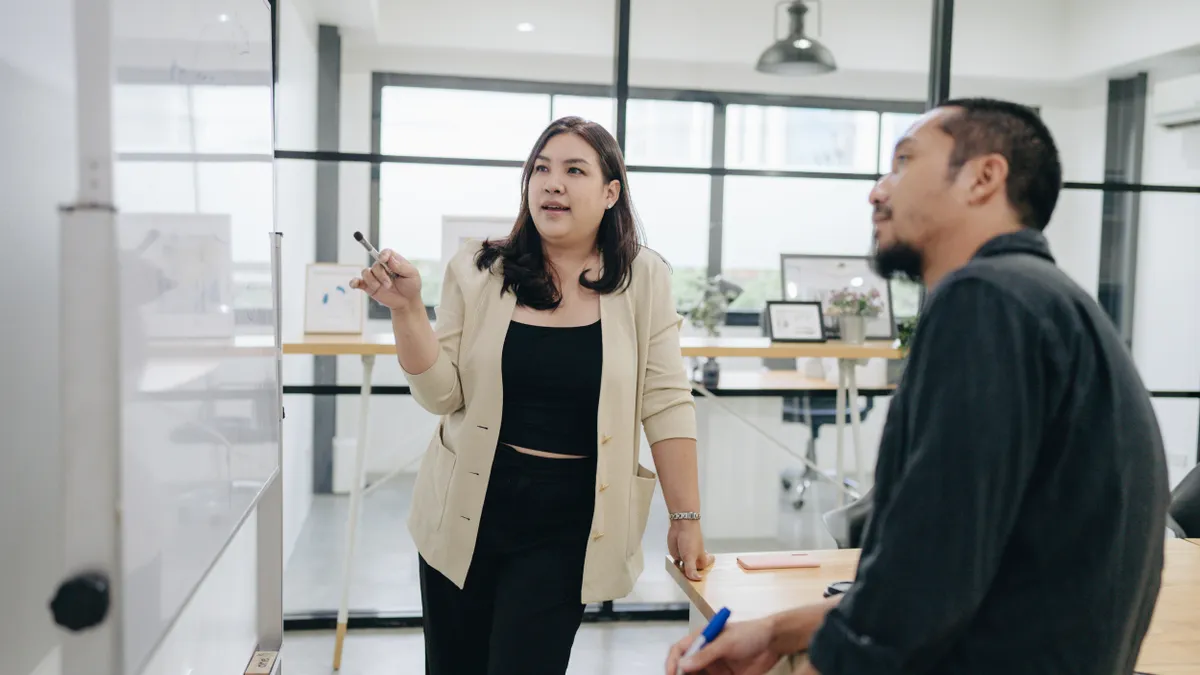The block is hot for AI in the supply chain industry and as companies turn to artificial intelligence for solutions, leaders are stepping out of the box to make room for neurodiverse talent.
One such leader is Paul Noble, founder and CEO of Verusen, a materials management software company. He spoke to HR Dive about a partnership between his company and Daivergent, a job readiness organization for neurodivergent job seekers and talent with disabilities.
Both Noble and Byran Dai, CEO and co-founder of Daivergent have neurodiverse relatives.
Judy Singer, a sociologist, coined the term “neurodiversity” in the 1990s. It refers to the range of individual brain function and behavioral traits — a normal variation across the human population. Neurodivergence includes disabilities such as ADHD, autism, depression and dyslexia.
“We have a personal connection to and an understanding of the challenges they face when it comes to careers,” Noble told HR Dive via email.
Along with career opportunities that can lead to systemic change, partnerships like that of Verusen and Daivergent aim to create solutions for the pressing issues of supply chain management.
A 2022 report from researchandmarkets.com projected that, by 2027, cloud-based AI as a service for supply chain management will top $3 billion worldwide. In general, AI in supply chain solutions will reach $16.7 billion in the next five years, researchers projected.
In the past six months alone, Sam’s Club has introduced robots to check inventory; FedEx and Microsoft extended their AI logistics partnership; Kraft announced that it would be pivoting to Microsoft products and Walmart got the ball rolling on implementing Symbotic AI technology.
“Within the autism community, we found many job seekers were able to outperform their neurotypical peers in careers that required detail-oriented and creative mindsets,” Dai said over email. “These are in-demand perspectives for much of the tech labor market especially in cybersecurity, AI, data and operations.”
For HR professionals across the board, the partnership is yet another case study for implementing a neurodiversity hiring initiative.
From Noble’s perspective, it’s going well: “The employees trained by Daivergent are helping us further develop AI and machine learning, specifically as they correlate to solving supply chain issues, by sharing annotations, and training data for new and exploratory AI tasks — all of which improve business outcomes,” he said.
Dai’s tip for employers looking to hire people with disabilities: educate, educate, educate.
“The most successful employers of neurodiverse talent all began by learning from others,” he said, pointing to the Neurodiversity at Work Employer Roundtable. The collective includes major players such as Deloitte, EY, Google and Willis Towers Watson.
Companies in this collective, who have well-established hiring programs, “are eager to share their best practices with new employers,” Dai added. “Hearing first-hand from their program managers and neurodiverse employees is one of the best ways to get started on this journey.”
He also pointed out that employers can look internally.
“Many programs began as ERGs for existing neurodiverse employees and allowed companies to involve those self-advocates in the development of their programs. By ensuring that programs are built in consultation with the community, companies can live by the vital neurodiversity mantra of ‘nothing about us, without us.’”













